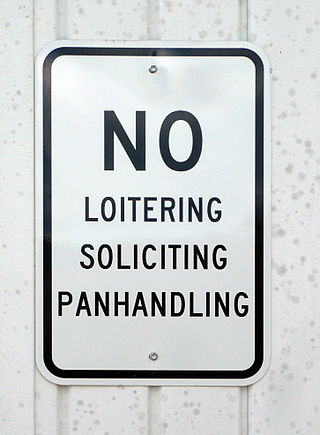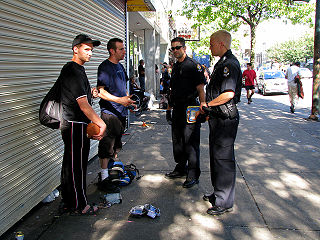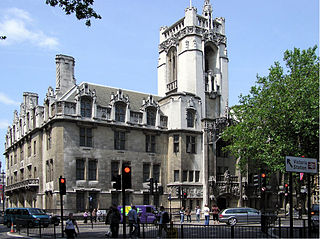
Insider trading is the trading of a public company's stock or other securities based on material, nonpublic information about the company. In various countries, some kinds of trading based on insider information is illegal. This is because it is seen as unfair to other investors who do not have access to the information, as the investor with insider information could potentially make larger profits than a typical investor could make. The rules governing insider trading are complex and vary significantly from country to country. The extent of enforcement also varies from one country to another. The definition of insider in one jurisdiction can be broad and may cover not only insiders themselves but also any persons related to them, such as brokers, associates, and even family members. A person who becomes aware of non-public information and trades on that basis may be guilty of a crime.
Perjury is the intentional act of swearing a false oath or falsifying an affirmation to tell the truth, whether spoken or in writing, concerning matters material to an official proceeding.
The courts of England and Wales, supported administratively by His Majesty's Courts and Tribunals Service, are the civil and criminal courts responsible for the administration of justice in England and Wales.

The legal system of Canada is pluralist: its foundations lie in the English common law system, the French civil law system, and Indigenous law systems developed by the various Indigenous Nations.

The Criminal Code is a law that codifies most criminal offences and procedures in Canada. Its official long title is An Act respecting the Criminal Law, and it is sometimes abbreviated as Cr.C. in legal reports. Section 91(27) of the Constitution Act, 1867 establishes the sole jurisdiction of the Parliament of Canada over criminal law.

The Sexual Offences Act 2003 is an Act of the Parliament of the United Kingdom.

The Computer Misuse Act 1990 is an Act of the Parliament of the United Kingdom, introduced partly in response to the decision in R v Gold & Schifreen (1988) 1 AC 1063. Critics of the bill complained that it was introduced hastily, was poorly thought out, and that intention was often difficult to prove, with the bill inadequately differentiating "joyriding" hackers like Gold and Schifreen from serious computer criminals. The Act has nonetheless become a model from which several other countries, including Canada and the Republic of Ireland, have drawn inspiration when subsequently drafting their own information security laws, as it is seen "as a robust and flexible piece of legislation in terms of dealing with cybercrime”. Several amendments have been passed to keep the Act up to date.
Capital murder was a statutory offence of aggravated murder in Great Britain, Northern Ireland, and the Republic of Ireland, which was later adopted as a legal provision to define certain forms of aggravated murder in the United States. In some parts of the US, this term still defines the category of murder for which the perpetrator is eligible for the death penalty. Some jurisdictions that provide for death as a possible punishment for murder, such as California, do not have a specific statute creating or defining a crime known as capital murder; instead, death is one of the possible sentences for certain kinds of murder. In these cases, "capital murder" is not a phrase used in the legal system but may still be used by others such as the media.
Public intoxication, also known as "drunk and disorderly" and "drunk in public", is a summary offense in some countries rated to public cases or displays of drunkenness. Public intoxication laws vary widely by jurisdiction, but usually require an obvious display of intoxicated incompetence or behavior which disrupts public order before the charge is levied.

A procurator fiscal, sometimes called PF or fiscal, is a public prosecutor in Scotland, who has the power to impose fiscal fines. They investigate all sudden and suspicious deaths in Scotland, conduct fatal accident inquiries and handle criminal complaints against the police. They also receive reports from specialist reporting agencies such as His Majesty's Revenue and Customs.
The Copyright Act 1957 as amended governs the subject of copyright law in India. The Act is applicable from 21 January 1958. The history of copyright law in India can be traced back to its colonial era under the British Empire. The Copyright Act 1957 was the first post-independence copyright legislation in India and the law has been amended six times since 1957. The most recent amendment was in the year 2012, through the Copyright (Amendment) Act 2012.
The law of Northern Ireland is the legal system of statute and common law operating in Northern Ireland since the partition of Ireland established Northern Ireland as a distinct jurisdiction in 1921. Prior to 1921, Northern Ireland was part of the same legal system as the rest of Ireland.

Loitering is the act of remaining in a particular public place for a prolonged amount of time without any apparent purpose.

Possession of stolen goods is a crime in which an individual has bought, been given, or acquired stolen goods.
The hearsay provisions of the Criminal Justice Act 2003 reformed the common law relating to the admissibility of hearsay evidence in criminal proceedings begun on or after 4 April 2005.

The Criminal Law Act 1967 is an Act of the Parliament of the United Kingdom that made some major changes to English criminal law, as part of wider liberal reforms by the Labour government elected in 1966. Most of it is still in force.

The Criminal Justice and Immigration Act 2008 is an Act of the Parliament of the United Kingdom which makes significant changes in many areas of the criminal justice system in England and Wales and, to a lesser extent, in Scotland and Northern Ireland. In particular, it changes the law relating to custodial sentences and the early release of prisoners to reduce prison overcrowding, which reached crisis levels in 2008. It also reduces the right of prison officers to take industrial action, and changed the law on the deportation of foreign criminals. It received royal assent on 8 May 2008, but most of its provisions came into force on various later dates. Many sections came into force on 14 July 2008.
Fair dealing is a limitation and exception to the exclusive rights granted by copyright law to the author of a creative work. Fair dealing is found in many of the common law jurisdictions of the Commonwealth of Nations.
The administration of justice is the process by which the legal system of a government is executed. The presumed goal of such an administration is to provide justice for all those accessing the legal system.

Patel v Mirza[2016] UKSC 42 is an English contract law case concerning the scope of the illegality principle relating to insider trading under section 52 of the Criminal Justice Act 1993. In 2020, the Supreme Court described this case as having set out a "a significant development in the law relating to illegality at common law".










